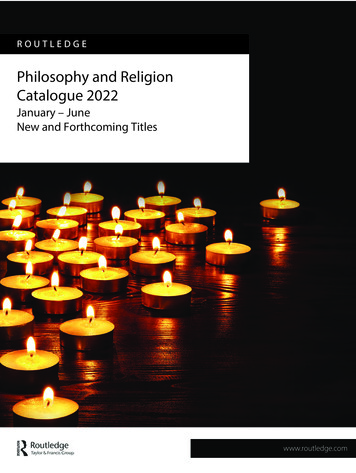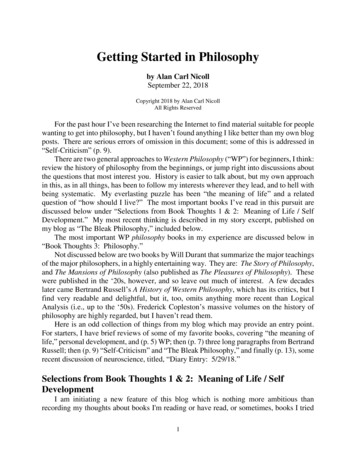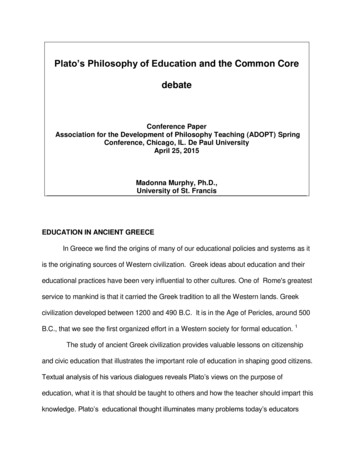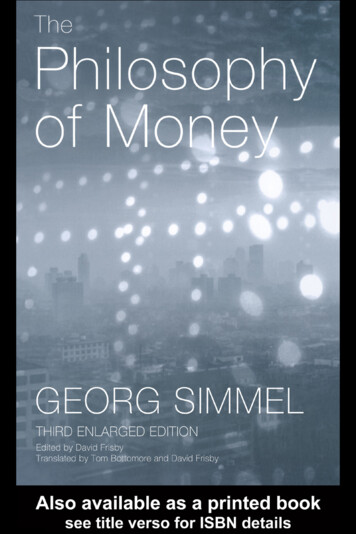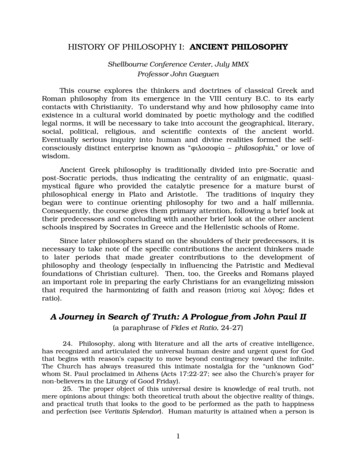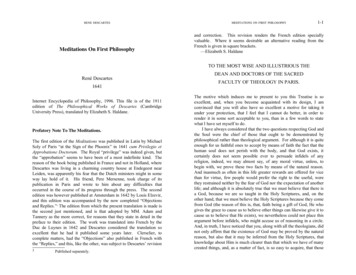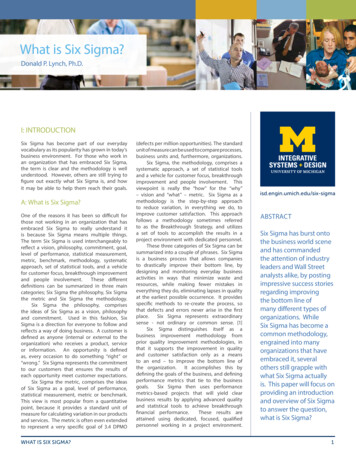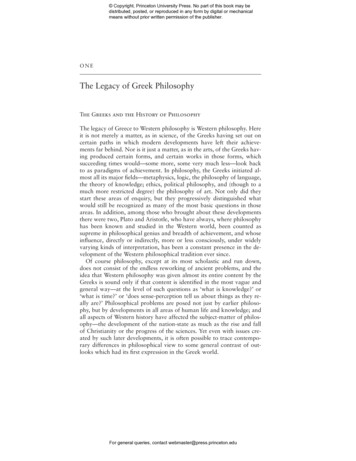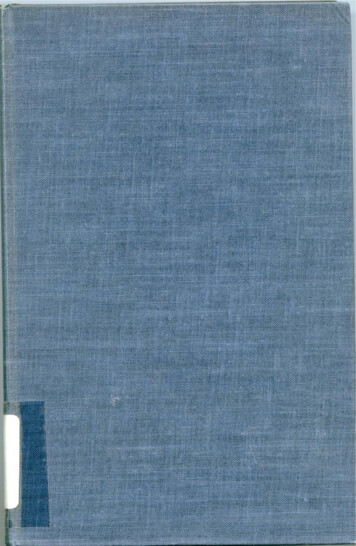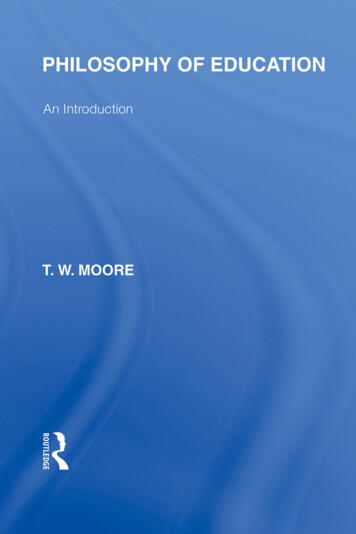
Transcription
PHILOSOPHY OF EDUCATIONAn IntroductionT.W.MOOREVolume 14LONDON AND NEW YORK
First published in 1982This edition first published in 2010by Routledge2 Park Square, Milton Park, Abingdon, Oxon, OX14 4RNSimultaneously published in the USA and Canadaby Routledge270 Madison Avenue, New York, NY 10016This edition published in the Taylor & Francis e-Library, 2010.To purchase your own copy of this or any ofTaylor & Francis or Routledge’s collection of thousands of eBooksplease go to www.eBookstore.tandf.co.uk.Routledge is an imprint of the Taylor & Francis Group,an informa business 1982 T.W.MooreAll rights reserved. No part of this book may bereprinted or reproduced or utilised in any form or byany electronic, mechanical, or other means, nowknown or hereafter invented, including photocopyingand recording, or in any information storage orretrieval system, without permission in writing fromthe publishers.British Library Cataloguing in Publication DataA catalogue record for this book is available from the British LibraryISBNÂ 0-203-86110-8Â Master e-book ISBNISBN 10:0-415-55946-4 (Set)eISBN 10:0-2038-6097-7 (Set)ISBN 10:0-415-56454-9 (Volume 14)eISBN 10:0-203-86110-8 (Volume 14)ISBN 13:978-0-415-55946-1 (Set)eISBN 13:978-0-2038-6097-7 (Set)ISBN 13:978-0-415-56454-0 (Volume 14)eISBN 13:978-0-203-86110-3 (Volume 14)Publisher’s NoteThe publisher has gone to great lengths to ensure thequality of this reprint but points out that some imperfectionsin the original copies may be apparent.DisclaimerThe publisher has made every effort to trace copyrightholders and would welcome correspondencefrom those they have been unable to trace.
Philosophy of education:an introductionT.W.MooreRoutledge & Kegan PaulLondon, Boston, Melbourne and Henley
First published in 1982by Routledge & Kegan Paul Ltd39 Store Street, London WC 1E 7DD,9 Park Street, Boston, Mass. 02108, USA,296 Beaconsfield Parade, Middle Park,Melbourne 3206, Australiaand Broadway House, Newtown Road,Henley-on-Thames, Oxon RG9 1EN.This edition published in the Taylor & Francis e-Library, 2010.To purchase your own copy of this or any ofTaylor & Francis or Routledge’s collection of thousands of eBooksplease go to www.eBookstore.tandf.co.uk. T.W.Moore 1982No part of this book may be reproduced inany form without permission from thepublisher, except for the quotation of briefpassages in criticismLibrary of Congress Cataloging in Publication DataMoore, T.W.Philosophy of education.(International library of the philosophy of education)Bibliography: p.Includes index.1. Education—Philosophy. I. Title. II. Series.LB1025.2.M57 370′.1 82–3670ISBN 0 7100 9192 3 AACR2ISBNÂ 0-203-86110-8Â Master e-book ISBN
Contents1      2      3     4   General editor’s note viii Acknowledgments x Philosophy and philosophy of education 1  Introduction 2  Philosophy and philosophy of education 3  The nature of educational theory 4  Educational theory and educational practice 5  Philosophy of education 6  Conclusion       1 General theory of education 1  Introduction 2  Educational aims 3  Aims and purposes in education 4  Assumptions about human nature 5  Two approaches to general theory of education 6  Conclusion       10 Knowledge and the curriculum 1  Introduction 2  What is knowledge? 3  ‘Knowing that’, ‘knowing how’ and ‘believing’ 4  Knowledge and the curriculum 5  Conclusion      19 Teaching and educating 1  Introduction 2  ‘Teaching’ and ‘educating’ 31 31 311135781011121415171919242529
Contentsâ vii      5       6      3  Training’ and ‘indoctrination’ 4  Education as ‘transaction’ or discovery’ 5  Participation and authority 6  Authority and discipline 7  Authority and punishment 8  Conclusion      33 Education, morals and religion 1  Introduction 2  Morals and education 3  Moral education 4  Moral education and teaching 5  Religion and education 6  Religious education and teaching 7  Conclusion        42 Social philosophy of education 1  Introduction 2  Equality and education 3  Freedom and education 4  Democracy and education 5  Conclusion      53 Bibliography 64 Index 653435383940424245474951525354565962
General editor’s noteThere is a growing interest in philosophy of education amongst students of philosophy aswell as amongst those who are more specifically and practically concerned with educational problems. Philosophers, of course, from the time of Plato onwards, have taken aninterest in education and have dealt with education in the context of wider concerns aboutknowledge and the good life. But it is only quite recently in this country that philosophy ofeducation has come to be conceived of as a specific branch of philosophy like the philosophy of science or political philosophy.To call philosophy of education a specific branch of philosophy is not, however, tosuggest that it is a distinct branch in the sense that it could exist apart from establishedbranches of philosophy such as epistemology, ethics and philosophy of mind. It would bemore appropriate to conceive of it as drawing on established branches of philosophy andbringing them together in ways which are relevant to educational issues. In this respectthe analogy with political philosophy would be a good one. Thus use can often be made ofwork that already exists in philosophy. In tackling, for instance, issues such as the rights ofparents and children, punishment in schools, and the authority of the teacher, it is possibleto draw on and develop work already done by philosophers on ‘rights’, ‘punishment’, and‘authority’. In other cases, however, no systematic work exists in the relevant branchesof philosophy—e.g. on concepts such as ‘education’, ‘teaching’, ‘learning’, ‘indoctrination’. So philosophers of education have had to break new ground—in these cases in thephilosophy of mind. Work on educational issues can also bring to life and throw new lighton long-standing problems in philosophy. Concentration, for instance, on the particularpredicament of children can throw new light on problems of punishment and responsibility.G.E. Moore’s old worries about what sorts of things are good in themselves can be broughtto life by urgent questions about the justification of the curriculum in schools.There is a danger in philosophy of education, as in any other applied field, of polarisation to one of two extremes. The work could be practically relevant but philosophicallyfeeble; or it could be philosophically sophisticated but remote from practical problems.The aim of the new International Library of the Philosophy of Education is to build up abody of fundamental work in this area which is both practically relevant and philosophically competent. For unless it achieves both types of objective it will fail to satisfy thosefor whom it is intended and fall short of the conception of philosophy of education whichthe International Library is meant to embody.The International Library has, for a long time, been in need of a suitable introductionwhich would help students to find their way about its other volumes. Mr Moore has supplied just what is required: an introduction that is clear and balanced with further readingsto guide students who wish to go more deeply into the topics he discusses.The book opens with an account of the change, both in philosophy and philosophy ofeducation, during the past thirty years. It attempts to demarcate the position of philosophy
General editor’s noteâ ixof education both in relation to philosophy and to educational theory and practice. Withineducational theory there is a discussion of the timehonoured topic of aims of education, whichis illustrated by the theories of writers such as Helvetius and Skinner which depended on amechanical view of human nature and those of Froebel and Dewey which depended on anorganic view. Throughout Mr Moore stresses that philosophy of education is theory-laden.After dealing with these general matters, Mr Moore passes to the more practical levelof the curriculum. The nature of knowledge is discussed and its relation to the curriculum. The implications for the curriculum of Utilitarianism, Professor Hirst’s ‘forms ofknowledge’ and Michael Oakeshott’s ‘heritage’ view are briefly and critically sketched.Mr Moore stresses the importance of making clear whether just knowledge or the worth ofknowledge is under consideration. The distinctions between ‘teaching’, ‘educating’, and‘indoctrination’ are examined, as well as the progressive and traditional approaches toteaching. Discipline and punishment are distinguished from each other, and their connections with authority explored. Throughout Mr Moore takes a balanced position betweenprogressive and traditional theories.In dealing with the connection, or lack of it, between morals and religion on the onehand and education on the other, Mr Moore stresses the contingency of the relationship.Though sympathetic to the teaching of morality in schools, and tolerant of the teachingof religion, he insists that this is a matter of moral decision, not of conceptual necessity.He is also opposed to using other subjects, such as history and literature, to teach moralbeliefs or religious doctrines. He finally outlines the social setting of education. Questions are raised about equality, freedom, and democracy in education. A sharp distinction ismade between equalitarianism and justice; the complications of freedom in education areexplored; and the paternalistic type of ‘people’s democracy’ of the East is distinguishedfrom Western democracy. In dealing with democracy in the school Mr Moore examineshow far its unavoidable paternalism can be modified to meet democratic demands.This concise introduction to philosophy of education is readable, succinct, and informative. It should be of great help to teachers, and any one interested in philosophy ofeducation, to find their way into the considerable literature that now exists in this branchof educational studies.R.S.P.
AcknowledgmentsMy thanks are due to my colleagues at the London Institute of Education who helped mewith this book. Reynold Jones read the first draft and discussed it with me. Richard Petersread the completed work and, in commenting on it, gave liberally of his knowledge andexperience. The imperfections in the book which remain are all my own.I should like here to acknowledge my debt to the students whom I have taught overmany years at the Institute, and from whom I am inclined to think that I have receivedas much as I ever gave. This book is to a great extent the result of the very stimulatingencounters between us.
1Philosophy and philosophy of education1 IntroductionThis book sets out to give a brief and elementary introduction to philosophy of education,a specialised branch of philosophy. A preliminary move must be to say something aboutthe two, about what kind of study philosophy is and about what philosophers of educationgenerally are trying to do. Unfortunately there are no simple and uncontentious answers toquestions which are bound to be asked here. Philosophers themselves are forever debatingwhat philosophy is and what sort of enquiries philosophers pursue, and apart from a generalagreement that philosophy tries to get at the truth on certain important questions by rationalmeans, there is little consensus about what philosophers are doing or ought to be doing.This is true also of philosophers of education, amongst whom there is quite considerablediversity of opinion about what exactly their task is or ought to be. What follows is therefore offered with some caution. It tries to present a particular view of the nature and role ofphilosophy of education and it is inevitable that the conclusions given will not all be acceptable to everyone who works in this field. Nevertheless, given this reservation it is hopedthat there will be substance enough to enable the newcomer to the subject to follow andperhaps take part in the ongoing debate about its scope and its role in educational thinking.This chaper is concerned mainly with the relationship which exists between what maybe called general philosophy, philosophy of education and educational theory.2 Philosophy and philosophy of educationPhilosophy of education is connected with general philo sophy partly by its purposes butmore directly by its methods. To explain this we need to look at the nature of philosophy asan enterprise. In the past it was thought to be the philosopher’s job to give a comprehensiveand rational account of the nature of reality and of man’s place in the scheme of things, andto deal with issues like the existence of God, the immortality of the soul and the purposeof the universe. Philosophy conducted in this way and to this end is known as metaphysics and from Plato’s day until comparatively recently metaphysics in one form or anotherhas been the main area of traditional philosophical activity. Plato, Aristotle, Descartes,Spinoza and Hegel, for example, were to a large extent occupied with giving somethinglike an overall picture of reality supported by arguments of a rational kind. The troublewith this kind of philosophy, however, was that each philosopher gave a different accountand no one account was found to be generally satisfactory. After more than two thousandyears of metaphysical speculation questions about the true nature of reality, the existenceof God, the nature of man and his soul, and the purpose of the universe are still asked andstill call for a generally acceptable answer. This persistence of problems in philosophyhas been seen as being in great contrast to the history of problems encountered in science.
2â Philosophy of Education: An IntroductionIt was noted that whereas scientists tended to solve their problems philosophers rarely ifever solved theirs. Philosophers were still dealing with the metaphysical problems raisedby Plato. So sometime during the first third of the present century a conviction grew thatperhaps the whole enterprise was misconceived. Scientists, it came to be said, solved theirproblems because they had genuine problems to solve and effective methods to solve them.Philosophers, puzzled by metaphysical questions, did not solve their problems becausetheir problems were not really problems at all. They were pseudo-problems generated usually by a misuse of language. This conviction led to a radical rethinking about the properrole and methods of philosophical enquiry.It is not easy to give brief and convincing examples to illustrate what was called the‘revolution in philosophy’ initiated by philosophers like G.E.Moore and Ludwig Wittgenstein, and their disciples, but two such examples may help. Metaphysicians like Descarteshad supposed that since the word ‘body’ was the name of a substantial material entity,the associated word ‘mind’ must also be the name of an entity, a substance, but of a nonmaterial kind. This assumption led to a particularly intractable philosophical problem: howdoes a non-material substance interact with and affect a material one, and vice versa?Granted the initial assumption the supposed interaction was a great mystery and a satisfactory explanation of it elusive. The new approach to philosophy, which saw philosophicalproblems as arising from the misuse of language, made it seem possible to account for andget rid of problems of the ‘mind-body’ sort. It was, for example, maintained by GilbertRyle [22] that if we abandon the assumption that for a word to be meaningful there mustbe some substantial entity for it to refer to, the mind-body problem no longer seems intractable. The term ‘mind’, Ryle argued, is not the name of a non-material entity. Indeed it isnot the name of a substantial entity at all and so the problem of how mind interacts withbody is not a genuine problem. To talk of the mind, Ryle maintained, is to talk about certainkinds of behaviour. ‘Mind’ is not the name of a thing or a substance but of a complicated setof bodily functions carried out in certain characteristic ways. If this account is accepted thelongstanding metaphysical ‘mind-body’ problem vanishes. The mind doesn’t interact withthe body; it is simply a function of the body. Thus the problem of interaction is not solvedso much as dissolved; it ceases to exist.Again, questions about the possible ‘purpose’ of the universe presented metaphysicianswith considerable difficulties. How could one ever decide what the purpose of the universewas, supposing it to have one? Metaphysicians’ answers to this question were generallyunsatisfactory since they seemed always to beg important questions, like that of theexistence of God. Moreover there was no conclusive way of telling whether such answersas were given were true or false. Faced with such difficulties philosophers now tried not tosolve the problem but to dissolve it. One way of doing this was to point out that whilst itis appropriate to ask the purpose of things, tools, gadgets and the like, which exist withinthe universe, it doesn’t make sense to ask the same question of the whole, of the universeitself. The universe is, by definition, ‘all there is’, and so what possible external purposecould it serve? The universe is an end in itself. The problem about what other end it serves,what its purpose is, is merely a pseudo-problem arising from the erroneous assumptionthat it makes sense to ask questions about the whole which are only appropriately askedof the parts. Once this is understood the problem ceases to be a problem. This kind of
Philosophy and philosophy of educationâ 3philosophising had for its purpose a kind of intellectual therapy, a ridding of the mind ofunnecessary and selfinflicted problems.It is not claimed here that these examples give unexceptionable answers to the problemsreferred to. They are given to show the shift in emphasis in philosophy, from attempts todeal with substantial issues, about what exists or has purposes, to an examination of thelanguage in which the supposed problems are stated. Philosophy, it was now said, is strictlya ‘higher-order’ activity dealing with linguistic and conceptual issues, with the ‘concept ofmind’ or the ‘concept of purpose’, rather than with minds or purposes as such, and dealing with problems which arise wholly or largely from linguistic or conceptual confusions.Philosophy came increasingly to be thought of as the analysis and clarification of conceptsused in other areas. Philosophy, it was maintained, has no distinctive subject-matter ofits own. It is a general mode of enquiry, about the concepts and theories presupposed inother disciplines, science, for example, or mathematics, history, law, or religion, and isconcerned, moreover, with the arguments and justifications found in those theories. Itsaim is to bring clarity to the concepts, to test the coherence of the theories, and to serve thetherapeutic purpose of dissolving those problems which persist only because of linguisticconfusions. This view of philosophy in general is a matter of debate which will not bepursued here. What will be maintained throughout this book is that philosophy as such isparasitic on theory and that philosophy of education is a higher-order activity which has forits host the theory and practice of education.A word of caution is needed here. Whilst it is true that some contemporary philosophyand certainly much philosophy engaged in over the past thirty years or so has been concerned with the identification and dissolution of pseudo-problems, it cannot be claimed thatphilosophy of education has made or has needed to make much headway in this direction.The problems thrown up by education are not usually problems arising from conceptualconfusion, but are real substantial problems arising out of practice, These problems needto be solved rather than dissolved. Philosophers of education are not normally preoccupiedwith metaphysical confusions. They certainly engage in a higher-order activity but theirinterest is with conceptual clarity as a preliminary to the justification of educational theoryand practice. The preoccupation with clarity involves them in philosophical analysis, theanalysis of concepts; the concern with the need for justification requires them to scrutinisethe various theories of education which have been offered. This is why it was said earlierthat philosophy of education is connected with general philosophy more directly by itsmethods than by its therapeutic purposes. Philosophy of education focuses on the languageof educational theory and practice. The nature of these areas and the relationship betweenthem now need to be examined.3 The nature of educational theoryPhilosophers of education, then, are concerned with a scrutiny of what is said about education by those who practise it and by those who theorise about it. We may regard thecomplicated phenomena of education as a group of activities going on at various logicallevels, ‘logical’ in the sense that each higher level arises out of and is dependent on theone below it. The lowest level is the level of educational practice at which activities liketeaching, instructing, motivating pupils, advising them, and correcting their work are car-
4â Philosophy of Education: An Introductionried on. Those engaged at this level, teachers mainly, will employ a language specificallyadapted to deal with their work and they will use a specific conceptual apparatus whenthey discuss what they are doing. They will talk about ‘teaching’, ‘learning’, ‘knowledge’,‘experience’ an indefinite number of such topics, with an indefinite number of associatedconcepts. These activities and these concepts are basic. Unless educational activities werecarried on and talked about there would be no subject matter for higher-order activities towork on. Arising out of these basic ground-floor activities is another activity, educationaltheorising, the first of these higher-order concerns. The result of educational theorising iseducational theory, or more accurately, educational theories.[12] The connection betweenpractice and theory is complicated and will be looked at later in this chapter. Here it will besufficient to say that educational theorising may be one or other of two kinds. The theoristmay be making a general point about education. He may say, for example, that educationis the most effective way, or the only way, of socialising the young, of converting themfrom human animals into human beings, or of enabling them to realise their intellectualand moral potentialities. Or he may say that education is the best way to establish a senseof social solidarity, by giving everyone a common cultural background. It is not importanthere whether or not such contentions are true. It is important to notice that they could betrue or false. It may well be true that education of the formal kind is an effective way ofsocialising the young or of securing social cohesion. Whether it is so or not is a matter offact and the way to find out is to look at education in practice and see what happens. In otherwords, theories of this kind are descriptive theories, purporting to give a correct account ofwhat education, as a matter of fact, does. Such theories stand or fall according to the waythe world happens to be. They belong to the social sciences, to descriptive sociology.The other kind of educational theory is one which does not set out, primarily at least,to give a description of the role or function of education but rather to give advice or recommendations about what those engaged in educational practice ought to be doing. Suchtheories are ‘practical’ theories, giving reasoned prescriptions for action. Theories of thiskind exhibit a wide variety, in scope, content and complexity. Some of them are fairly limited in character, such as the theory that teachers should make sure that any new materialintroduced to the pupil should be linked to what he knows already, or that a child should notbe told a fact before he has had a chance to find it out for himself. Limited theories like thismay perhaps be better called theories of teaching, or pedagogical theories. Other theories ofthis kind are wider in scope and more complex, such as the theory that education ought topromote the development of the innate potentialities of the pupil, or that it ought to preparehim for work, or to be a good citizen or a good democrat. Theories like these may be called‘general theories of education’ in that they give comprehensive prescriptions, recommending the production of a particular type of person and, very often, a specific type of society.These overall types of educational theory are often met with in the writings of those whofor other reasons are known as philosophers. Plato, for instance, gives a general theory ofeducation in the dialogue known as The Republic, in which his aim is to recommend a certain type of man as worthy to be the ruler of a distinctive type of society. Rousseau gives ageneral theory of education in Emile. Others are given in Frobel’s The Education Of Man,in James Mill’s ‘Essay on Education’, and Dewey’s Democracy and Education. In eachcase the theory involves a set of prescriptions addressed to those engaged in the practice ofeducation, and in most cases, if not in all, the theory is meant to serve an external end, to
Philosophy and philosophy of educationâ 5prescribe a political, social or religious way of life. General theories of education are veryoften influential essays in propaganda.Two further points need to be made here about these general, prescriptive theories. First,it must be recognised that, unlike theories about education, they do not belong to the socialsciences. They are not meant to be descriptions of what actually goes on in the world, butare recommendations about what ought to be done. As such they involve a deliberate commitment on the part of the theorist, an assumption of some end which he considers ought tobe adopted and worked for. The recommendations which constitute the conclusions set outin the theory presuppose a major value component, the notion of an ‘educated man’. Thisvalue commitment means that theories of this kind cannot be verified or validated in theway that scientific, descriptive theories may be. Whereas a scientist is committed only tothe formal assumption that the truth is worth having but not to any prior notion about whatthat truth should be, an educational theorist commits himself initially to the conviction thata certain substantial state of affairs is desirable, that a certain type of individual shouldexist. So whilst a scientific theory may be established or rejected simply by checking itagainst the facts of the empirical world, the validation of a prescriptive theory demandsa more complex and piecemeal approach, involving both an appeal to empirical evidenceand a justification of a substantial value judgement.The second point is that such general theories are sometimes known as ‘philosophies ofeducation’, so that one reads of Plato’s, or Froebers, or Dewey’s ‘philosophy of education’.This book takes the view that to call them such is misleading. Not all that is written byphilosophers qualifies as philosophy, and these comprehensive practical theories of education are not themselves philosophical products. They are general theories of educationoffered by philosophers. They may be closely connected with philosophy of education butthe connection is not that of equivalence or identity. What the connection is, in fact, nowneeds to be looked at.4 Educational theory and educational practiceWe may do this by bringing together points made in the first two sections of this chapterto show the role and function of philosophy of education. In section 1 it was said thatcontemporary philosophy tends now to be seen as a higher-order activity which dealswith conceptual and linguistic problems arising out of ground-floor activities like science,mathematics and history, using the content of these disciplines as subject matter. In section2 it was maintained that education itself is a first-order activity, concerned with teaching anddeveloping the young. Education has its own immediate higher-order activity, educationaltheorising, the making of theories about education and theories of education. The furtherpoint was made that philosophy of education is another higher-order activity parasitic uponthe practice and theory of education. It is not the same thing as educational theory, but it takestheory as its main subject matter. This contention must now be dealt with in more detail.Teachers engage themselves professionally in educational activities, ground-floor activities of a certain kind. They teach in various ways: they set tasks for pupils, they try tomotivate pupils, to help them, to control their performances, and to improve their understanding and skills. In doing all this they necessarily act on theories of a practical kind. Apractical theory involves a commitment to some end thought worth accomplishing, and
6â Philosophy of Education: An Introductioneverything a teacher does in his professional work involves such a commitment, togetherwith a recognition that certain measures are necessary to bring about that end. Even mundane, everyday classroom activities like asking children to be quiet, to open their booksand to write in them are based on theories, limited theories admittedly, but theories nonetheless. It is held as a theory that if you want pupils to hear what you say you must see toit that they are reasonably quiet; that if the teacher wants them to write something he mustsee that they have writing materials. If the teacher allows children to work in groups, thisfollows from a theory about the best way to achieve his educational ends; if
Philosophy of education. (International library of the philosophy of education) Bibliography: p. Includes index. 1. Education Philosophy. I. Title. II. Ser

